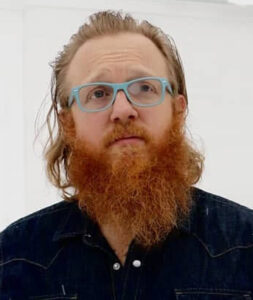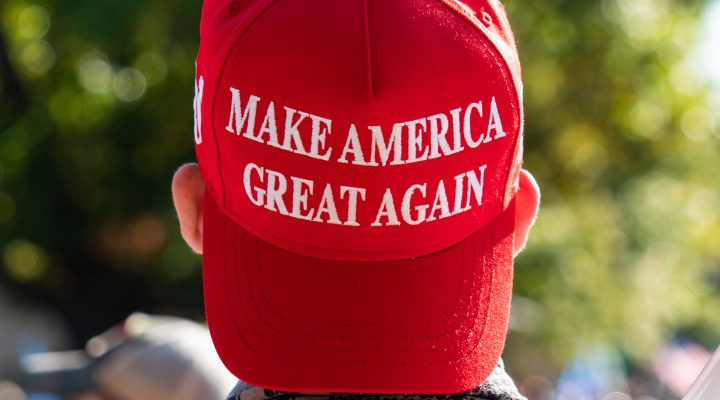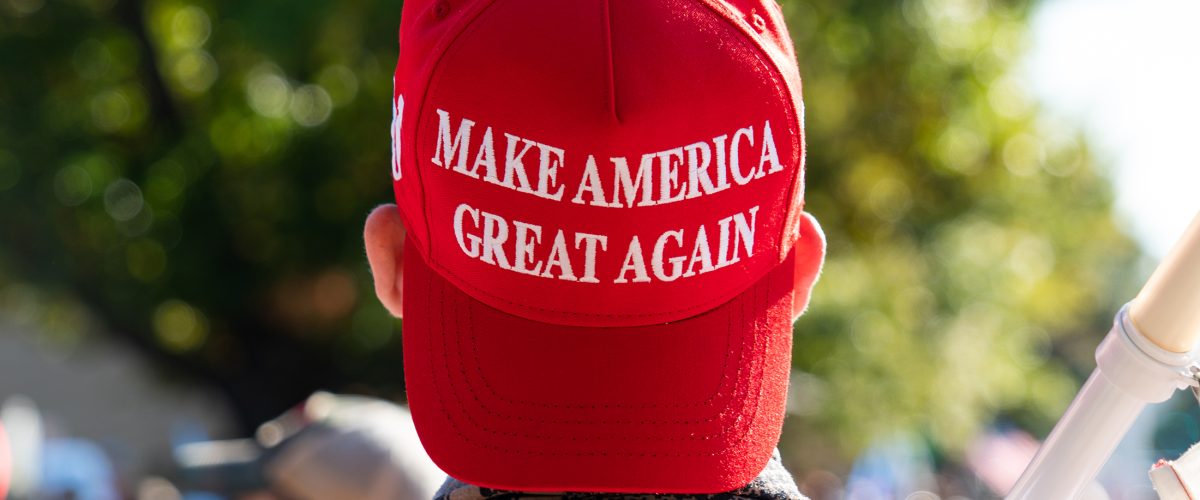The last time this happened, I met with two other ministers in a bottle shop. The owner opened up early for us. We filed in with bags under our eyes, proof we stayed awake too late watching news outlets and refreshing our phone screens. Stress, worry, disbelief on our faces. We sat in silence. None of us knew where to begin; we spent the next few moments baptizing our lips in beer.
Glancing out the window, I caught sight of the trees. Gone was any sign of fall foliage. The remnant of leaves looked like sailors clinging to a ship’s railings in choppy waters. Their pop of color, change and transformation was over.

Justin Cox
So was mine. So was the United States.
“I think we could use something a little stronger,” I said.
I pulled the bottle of blueberry-infused whiskey from my bag. The owner didn’t say a word as we passed it around. When the Spirit came to rest in front of her, she took a sip, too.
For the next hour, we aired our grievances and shared our shock. In between gulps of ale, we passed WTF looks to one another like deacons pass offering plates on Sunday morning.
All of us had places to be, but no one made a move to leave. If I had a dollar for every time one of us uttered, “I can’t believe this,” I’d have had enough for another bottle of hooch. Finally, with each of us carrying higher blood alcohol concentrations and lower levels of hope, we decided to face the world. We walked back out into an afternoon where the sun was out, but no light was seen or felt.
“It wasn’t his first lie, only the next.”
The date was Nov. 9, 2016. Hillary Clinton had just given her concession speech. Soon afterward, Donald Trump declared he’d be a president for all Americans.
It wasn’t his first lie, only the next.
The next four years were as surreal as that day in the bottle shop. Hostile off-the-wall tweets at all hours of the night; pulling the United States out of the Paris Agreement; stacking the Supreme Court, which brought about the overturning of Roe v. Wade. The Stormy Daniels scandal. The abuse of pardoning power. The constant demand for loyalty. Staff firings left and right. I could keep going, but I’ll stop with his refusal to accept defeat in the 2020 election, his stoking of conspiracy theories, and his role in the January 6 attack on the U.S. Capitol.
However, when the smoke cleared and Biden entered the White House in January 2021, I thought Trump would fade away like a pesky hemorrhoid, but he was persistent. No amount of Preparation H or indictments would stop him. He began campaigning that very same year. The absurdities continued, “Let’s Go, Brandon” sales skyrocketed, and his MAGA followers grew. Project 2025 and Christian nationalism were mentioned along with his name. Leading up to the 2024 election showdown with Kamala Harris, warnings began to fly about the ramifications of a Trump victory and the death of democracy.
None of it mattered.
Like many, I watched Tuesday night as battleground states turned pink and later red. By midnight, I had switched to watching episodes of A Chef’s Life on PBS. I drifted off but woke before the sun came up to see the writing on the wall.
We, as a country, decided to march, willfully and ignorantly, backward.
“We, as a country, decided to march, willfully and ignorantly, backward.”
On Wednesday morning, I drove half a mile to my office. As I hit the historic downtown area’s main drag, I watched town workers plant large American flags up and down the street in preparation for Veterans Day. There were 50 more flags on the village green. While I know the reason rested in the observance of a federal holiday, it was hard not to think of their presence mockingly.
After talking with the office manager, I slumped into my desk chair. Wednesdays are the days I typically start fleshing out a sermon. While I am usually a lectionary preacher, I felt compelled to let the Spirit move me in any way she saw fit.
I found something dealing with temptation, power and encountering the divine in the wilderness. I started writing, but I knew I was missing something — hope.
I understand my role as pastor is to be a harbinger of hope. I am to give those I shepherd hope. Preaching messages of love, mercy and hope is a priority. I do this not because it’s my job and what’s expected but because I believe if a minister can’t share a message of hope, they’re in the wrong line of work. On my better days, I believe in and live this. It’s possible because we are part of a loved creation, and a sacred Spirit connects us with each other and calls us to live for hope.
However, this isn’t one of those better days; my hope is in short supply. Leading me to want to swap it for something else until it returns.
In place of hope, I want to preach about those like Nate Turner.
I want to preach, no petition, followers of the lowly Galilean walk out of their sanctuaries with arms locked like King, Rustin and Lewis during Freedom Summer.
I want to preach the holiness of the Stone Wall Riots.
I want to preach about Thomas Helwys and how Baptists don’t require a king, a Caesar or a president — only Jesus.
I want to preach oracles against the nations like the prophets of old, such as Isaiah, Ezekiel and Jeremiah. I want to holler for justice like Amos.
I want to preach, no scream, like Katniss Everdeen — If we burn, you burn with us.
“I want to preach, I want to damn, white supremacy from the pulpit until the church shouts ‘Amen!'”
I want to preach, I want to damn, white supremacy from the pulpit until the church shouts “Amen!”
I want to preach to evangelicals you can’t serve Trump and Jesus.
I want to preach to them how my daughter, lying in bed, tears up at the thought of bad people in our world every night. Those looking to hurt her, not listen to her, and take away her rights.
I want to preach how this is a time to decide to be either in the ilk of the Reich Church or the Confessing Church.
I want to preach, cry out, the hypocrisy of the so-called Christian nation.
I want to preach how the great American Experiment has been weighed, measured and found wanting. It, we, failed.
I want to preach, “Can you forgive us, Father? Even when we knew exactly what we were doing?”
And I want to preach, no, confess, I can’t see any hope in the American church right now.
I just pray others can hope for me until I can again.
Justin Cox received his theological education from Campbell University and Wake Forest University School of Divinity. He is an ordained minister affiliated with the Cooperative Baptist Fellowship and enrolled in the Doctor of Ministry program at McAfee School of Theology. When not spending time with his spouse and daughters, he can be found writing and baking late into the night. He currently resides in New England with his family. His thoughts and reflections are his own.
Related articles:
Trying to make sense of nonsense | Opinion by Joel Bowman
Social justice groups are exhausted, angry and determined
Letter to my Black daughter on the 2024 election | Opinion by Maina Mwaura


